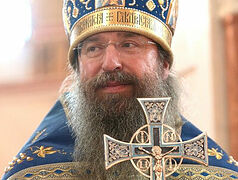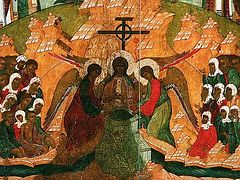The bodily means little to the soul
but without it, salvation is in doubt.
Whoever forgets labors and weeping,
Treads the path of degeneracy.
*
O man! Obedient to the flesh,
gatherer of earthly debris!
Become as God in your freedom,
and called to become so by grace!
Hieromonk Roman (Matyushin-Pravdin)
Hieromonk Agafangel (Davlatov) of Sretensky Monastery spoke about the importance of the Dormition Fast.
—Fr. Agafangel, why should a Christian observe the Dormition Fast?
—For a Christian, observing the Dormition Fast has the same spiritual significance as observing the Wednesday and Friday fasts, Great Lent, and the Nativity and Apostles Fast. Fasting is our sacrifice to God according to our measure; that is, we voluntarily restrain ourselves to thereby express our gratitude to the Heavenly Father, to express repentance for our sins, to then have the moral right to ask for something in exchange for our limitation in food and entertainment (the resolution of conflicts, healing, that events might go well, and so on).
The understanding of fasting as a sacrifice comes down to us from Old Testament times; now fasting is first of all a means for a more successful battle with the passions, like medicine for the infirmity of flesh and the mind. Thus, it’s not God Who needs fasting, but us, so it would be easier to ascend to the Creator in prayer, break away from the earthly and corruptible, and prioritize correctly. I think many would agree with me if I said that a man who lives in satiety is more reluctant to pick up a prayer book or the Gospels than someone who eats simply, according to his actual bodily needs. No wonder people talk about: “Brains weighed down with fat.” Conversely, someone who eats more lightly has a sharper and more inquisitive mind, able to penetrate deeper into the recesses of the heart, to carefully listen to or read useful information (and this point isn’t just about the spiritual life). Similarly, the body facilitated by fasting becomes more suitable for prostrations and participation in the services, however strange that may sound!
—What is the idea and purpose of the Dormition Fast?
—Besides helping in ascetic work, the fast before the Dormition of the Mother of God leads us into the sorrow of parting with the Theotokos, when she left the Apostles and other disciples of Christ in her body. But the joy of the Divine services and the festal trapeza comforts us, reminding us of the resurrection of the Virgin Mary and her invisible presence with every one of us.
—What tasks should we set for ourselves during this fast; what should we focus on?
—Fasting should help us become better, therefore, the best thing would be to identify your main passion and begin to battle with it. For this we need not only the Gospel, prayer book, and Psalter, but also other spiritual books where the saints and spiritually experienced people share the stories of their ascent to God and give us counsel about the best way to uproot vices from the soul and body and replace them with virtues.
The goal of the Christian life is salvation from slavery to sin and the law of death, the forgiveness of sins, and obtaining the right to enter the Heavenly Kingdom, into union with God. Fasting helps us lighten our load so it would be easier to walk the path to this Kingdom.
Faith without works is dead, so it’s good to add works of mercy to our abstinence from non-fasting foods and idle amusements. First of all, we should be attentive to our loved ones; unfortunately, it’s sometimes easier for us to give a kind word or do something nice for a stranger, while it’s hard to do the same for a relative or old friend—sometimes resentment wins out, or stinginess won’t allow it, or laziness takes over.
—How should we spend the days of the Dormition Fast?
—The answer is simple: Open the Church typikon, which has recommendations for prayers, and tells us what foods are allowed on every day of the Fast.
The typikon was written through experience, by the practice of the spiritual and daily lives of our ancestors. At its core, the typikon is a collection of recommendations for what to do… But if you sense that what it says is above your ability, concessions are allowed. You have to have discernment when applying the typikon, based on what your body and conscience can realistically do. If you push yourself too hard, you can overdo it; if you’re too easy on yourself, it won’t bring any benefit. Illness and old age are valid reasons to relax the typikon.
St. John Cassian the Roman spoke wonderfully about this:
And so on the manner of fasting a uniform rule cannot easily be observed, because everybody has not the same strength; nor is it like the rest of the virtues, acquired by steadfastness of mind alone. And therefore, because it does not depend only on mental firmness, since it has to do with the possibilities of the body, we have received this explanation concerning it which has been handed down to us: that there is a difference of time, manner, and quality of the refreshment in proportion to the difference of condition of the body, the age, and sex: but that there is one and the same rule of restraint to everybody as regards continence of mind, and the virtue of the spirit. For it is impossible for every one to prolong his fast for a week, or to postpone taking refreshment during a two or three days’ abstinence. By many people also who are worn out with sickness and especially with old age, a fast even up to sunset cannot be endured without suffering. The sickly food of moistened beans does not agree with everybody: nor does a sparing diet of fresh vegetables suit all, nor is a scanty meal of dry bread permitted to all alike. One man does not feel satisfied with two pounds, for another a meal of one pound, or six ounces, is too much; but there is one aim and object of continence in the case of all of these: that no one may be overburdened beyond the measure of his appetite, by gluttony (Institutes 5.5).[1]
St. John Chrysostom adds:
Besides abstinence from food, there are many means that can open to us the doors of boldness before God. Whoever eats food and is unable to fast, let him give abundant alms, let him offer fervent prayers, let him show intense zeal for hearing the word of God—here bodily weakness does not hinder us in the slightest—let him reconcile with his enemies, let him expel from his soul all remembrance of evil. If he does this, then he keeps a true fast, such as the Lord requires of us. After all, abstinence in food is commanded so that by curbing the desires of the flesh, we might make it obedient in fulfilling the commandments.
—Why is the Dormition Fast just as strict as Great Lent?
—Initially, the Sts. Peter and Paul (or Apostles) Fast and the Dormition Fast were two parts of the so-called “substitute fast,” for those who weren’t able to fast during the Holy Forty Days.
Over the years, the practice changed, the ideological content changed, and the Apostles Fast became lighter, while the Dormition Fast preserved its severity (due to the particular veneration of the Theotokos among the faithful).
—How can a modern person get accustomed to fasting, given that everything all around is aimed at pleasure, at satisfying the senses?
—First, we have to understand that fasting and dieting are different concepts. Dieting helps us lose excess weight, while fasting is asceticism—aimed at spiritual perfection—and a voluntary sacrifice to God. When we have an awareness of the necessity of fasting, then the motivation appears. It’s always hard for us to do something that seems vain and pointless…
Second, human needs are basically the same as they were thousands of years ago—the rest is imposed upon us through the media, ads on the street, and idle talk with friends; therefore, it’s better to limit our TV, tablet, phone usage, and protect ourselves from empty chatter. When we remain, to the best of our ability, cut off from temptations, there are fewer occasions for sin.
 Additionally, in fasting, as in any spiritual work, we must adhere to the middle, royal path. St. Ambrose of Optina says:
Additionally, in fasting, as in any spiritual work, we must adhere to the middle, royal path. St. Ambrose of Optina says:
Fasting is praiseworthy and necessary in its time and place: It is better to keep to a moderate use of food and drink, avoiding satiety, indicated by a slight heaviness, and on the other hand, avoiding excessive and inappropriate abstinence. Both extremes are harmful. Moderation, the middle path, makes a person more capable of spiritual activity.
And finally, it is very sobering to discuss the finiteness of earthly life, to think about meeting the Lord and eternal life. In his book, Christ Lives in Me, Bishop Basil (Rodzianko) wrote:
After all, we were not created to die, not so our life would end and turn into nothing. Our life must become eternal. This is what the Creator intended… And the death of the Most Holy Theotokos is called the Dormition because it is the sleep of the body. But just as after normal sleep, we must certainly awaken. And this awakening is participation in the Resurrection of Christ, in immortality, which becomes an eternal resurrection.
If we remember this, we’ll love fasting.





